Elevated lead levels found in some St. Paul drinking water for first time in decades
ST. PAUL, Minn. — Families in Minnesota's capital city could be dealing with contaminated drinking water.
For the first time in more than 20 years, routine water tests found elevated levels of lead in some homes.
"I actually was kind of shocked," said St. Paul resident Vanessa Diaz.
Diaz was among the nearly 95,000 residents who received a letter from St. Paul Regional Water Services letting customers know about the results of the testing.
They said of a random routine sample of 105 faucets from across the city, 13 exceeded the acceptable level of lead, which is 15 parts per billion. For some perspective, they said it's like 15 drops of lead in an Olympic-sized swimming pool.
"The water leaving our plant does not contain lead. Nor do our water mains that get it all the way to your home," said SPRWS assistant general manager Racquel Vaske. "Where lead exists is between the water main out in the street in front of your home and the inside of your home for those 26,000 homes [that still have lead service lines]."
READ MORE: Minnesota House approves legislation dedicating $240M to remove lead pipes
SPRWS said it plans to remove all lead service lines for free in the next 10 years. The city also offers financial assistance for residents hoping to replace their service lines sooner.
"We don't want customers to panic. We know that we have lead service lines. We're taking it very seriously. We've launched Lead-Free SPRWS to get rid of them," Vaske said.
Since the project started in 2022, Vaske said the city has replaced about 1,000 service lines.
St. Paul residents can find out if they have lead service lines by going online. The city also offers free water testing. Results are expected to take four to six weeks.
"We know that there is no safe level of lead and we want to get these lead service lines out and we want to keep customers informed, so we're hoping that this extra attention just helps us do that," Vaske said.
Lead is considered hazardous to health, particularly in infants, children and pregnant people.
SPRWS's tips to reduce lead exposure:
• Clean your aerator. At least once a quarter, remove your aerator from your drinking water faucet and rinse out the filter to remove any small particles.
• Let the water run before using it for drinking or cooking. If you have a lead service line, let the water run for three to five minutes. If you do not have a lead service line, let the water run for 30 to 60 seconds. The more time water has been sitting in your home's pipes, the more lead it may contain.
• Use cold water for drinking, cooking and preparing baby formula. Hot water absorbs more lead from pipes than cold water. Boiling water does not reduce lead levels and may actually increase them.
• Test your water at SPRWS or one of the many laboratories that offer this service. Call 651-266-6350 for information on obtaining a water sample container for testing. Click here to search for other accredited laboratories.
• Treat your water or find an alternative source if a test shows your water has high levels of lead.
• Get your child tested for lead exposure by contacting your local health department or doctor. Click here to find out more information about child lead poisoning prevention.
There will be a public meeting about lead levels on Nov. 28 from 5 p.m. to 7 p.m. at SPRWS headquarters.








